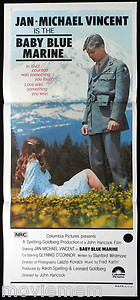
BABY BLUE MARINE
US, 1976, 90 minutes, Colour.
Jan Michael Vincent. Glynnis O'Connor, Katherine Helmond, Dana
Elcar, Bert Remsen, Richard Gere.
Directed by John Hancock.
Baby Blue Marine is an enjoyable film. It is a slight one, maybe not particularly good, but it has appealing optimism and humanity. It claims nostalgic feelings from the credits and takes us back to World War II, critical of the militaristic style, the atmosphere of hate and violence, yet proud of the heroism that the war brought out of people. Set mainly in a small town, with pleasing small town people and way of life, the film shows an official misfit and reject finding acceptance, dignity and heroism. Jan Michael Vincent is cornering the market in this kind of role; he is supported by the charming Glynnis O'Connor.
1. The overall appeal of this film? For what audience was it made? Impact in the 70s?
2. The importance of the credits, the illustrations, Saturday Evening Post style, the nostalgia for the 40s, the music and the dialogue reminiscent about the forties and its innocent way of life, the values praised, the implied contrast with the present? How accurate was the presentation of these old values?
3. How did the film create the atmosphere of World War II? America and its attitude towards the war? People's expectation of war, soldiering, heroism? A 70s glance backward at the American values of patriotism, heroism and participation?
4. The details of marine training: the personnel involved, the dominance of the instructors and the officers, their attitudes towards misfits and those who did not conform? The idealism of American heroes going to war? The contrast with the misfits with their tenseness, fatness? How convincing were these misfits? The drill, the accidents, their work, the importance of their talks in the dormitories? How did the film create this marine environment for developing characters?
5. Was the hero convincing in this kind of atmosphere? His idealism about the marines, his reputation at home, family and town expectation? The reason for his tenseness, the illustrations of this? How attractive a character, his warm and nice characteristics? His disappointment in being discharged? The humiliation of dressing the discharged men in baby blue? How credible were these situations and characters?
6. The importance of the encounter with the young war hero, the naivety of the hero, the experience of the young veteran? The talk, the revelation of the hardships of war in the Pacific, the drinks and the effects on the hero, his being exploited and the uniform being changed? Was the audience apprehensive as to what was going to happen?
7. How important was the incident of the change of uniform advice for the development of the plot? The reason for the heroes to change, become the other nun? His concern about the other man and his going back to the war? The sympathy in the character of the hero?
8. The importance of showing people's regard for a marine hero? Their regard for the service and not the person? A chance for a person to develop via the status?
9. How attractive was the portrayal of the town, the people and their friendliness? The details of friendliness, the effect on the hero? Respect for him, self-respect and fitting into an identity? How importantly did he change?
10. The characterisation of the family, especially the girl? The charm of the family scenes, the meals, the talk, the football game? The hero worship of the young boy? The walks in the countryside with the young girl? The genuine humanity of these sequences?
11. The other characters in the town: the father whose son was killed and his admiration for the marines, the sheriff, the jealous boy, the anti-Japanese feeling? How credible the characters and their discussions?
12. The importance of the Japanese camp in the town, attitudes towards the Japanese, their escape? The formation of the posse and the various attitudes of violence and non-violence? The guns. stalking the Japanese? The worry of the father about the jealous boy and his gun? The heroism expected of the hero?
13. The capture of the Japanese and its ordinariness, the river, the shooting and the conversations, the Japanese helping with the rescue of the hero? The humour, the pathos and the genuine humanity?
14. Audience anticipation of an unhappy ending? How satisfying was the ending? The emergence of the hero,, a life on which values could be based?
15. The qualities of the film in its characterisation. human themes. a yearning for ordinary human values as the basis for living?